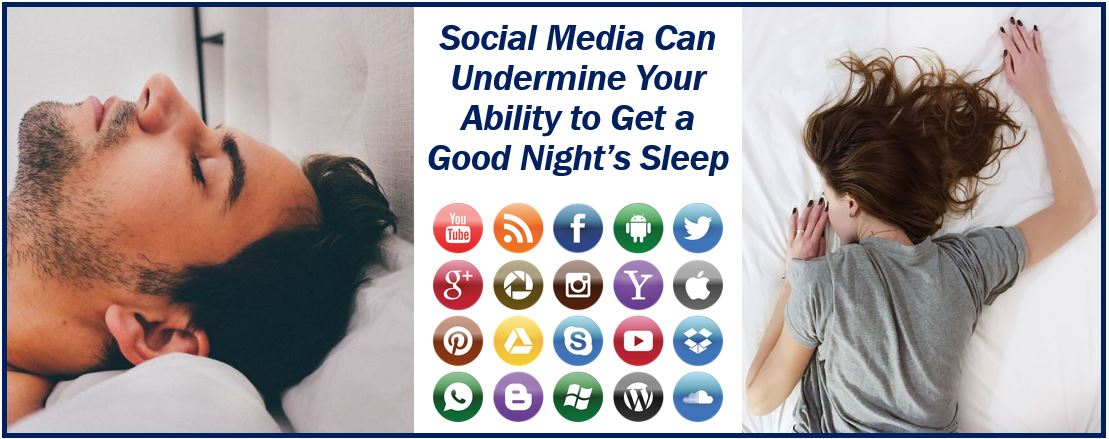 In the United States, 50-70 million adults have a sleep disorder that affects their daily life. The consequences of not getting enough deep quality sleep are serious. For instance, the American Sleep Association says 4.7% of people reported nodding off or falling asleep while driving. Drowsy driving is responsible for 1,550 fatalities and 40,000 nonfatal injuries each year.
In the United States, 50-70 million adults have a sleep disorder that affects their daily life. The consequences of not getting enough deep quality sleep are serious. For instance, the American Sleep Association says 4.7% of people reported nodding off or falling asleep while driving. Drowsy driving is responsible for 1,550 fatalities and 40,000 nonfatal injuries each year.
Why are people so tired all the time? While long commutes and busy schedules certainly play a role, recent studies suggest social media plays a bigger role. Social media can trigger both psychological and biological obstacles to getting a good night’s sleep. For instance, social media is addicting and the compulsion to scroll through Facebook or Twitter can interfere with the ability to sleep.
Using social media also results in exposure to the blue light emitted by screens. Minimal exposure isn’t a big deal, but let’s be real – almost nobody uses social media minimally.
Social media is a sleep liability
Anything that has the potential to prevent you from getting deep sleep is a sleep liability. Social media is perhaps the largest sleep liability in today’s world. Twenty years ago, the idea of dragging your computer to bed would have been ridiculous. In 2015, Bank of America released results from their Trends in Consumer Mobility Report, which found 71% of people sleep with their phone or keep it within reach during the night.
Having a smartphone within reach during the night makes it tempting to jump on social media at all hours of the night. Many people don’t silence their phones and jump to answer messages and comments as soon as they hear the notification. If you’re one of those people, you’re cheating yourself out of deep sleep.
Social media notifications are interrupting your sleep cycle
If you don’t silence your phone at night and your social media notifications are audible, your sleep is being disturbed, even if you don’t grab your phone.
When you sleep, your body cycles through phases of non-rapid eye movement (NREM) and rapid eye movement (REM) sleep. Your body needs REM sleep in order to wake up refreshed. REM sleep only accounts for 25% of all sleep, but it takes a while to reach that stage. If you’re woken up before reaching that deeper stage of sleep, you’ll wake up exhausted.
Screens disrupt melatonin production
All modern devices like smartphones, tablets, and computer monitors emit blue light. Blue light has a stimulating effect on the nervous system. Exposure to blue light suppresses melatonin synthesis which throws off your circadian rhythm.
Your body produces melatonin toward the evening to make you feel tired enough to sleep. If your body can’t produce melatonin, you won’t feel tired enough to sleep.
It’s not just blue light that suppresses melatonin production. Any light at night will suppress melatonin. The human body is programmed to synthesize melatonin as the sun goes down and it waits for the right cues to begin production. Artificial light stalls the process and actually causes the body to start producing melatonin later and for a shorter duration. For many, the result is insomnia.
How to form sleep habits that will leave you refreshed
If you’re constantly tired or exhausted, you can get your sleep back on track with a few good habits.
- Read a book to get sleepy. If you can’t sleep, don’t grab your phone for entertainment – you’ll only push sleep further away. Instead, read a few chapters in a book to wind down, but don’t expect to fall asleep right away. When your body hasn’t been producing melatonin regularly, it will take a while for sleep to come easy.
- Create a bedtime routine. Declare a time you’ll be in bed and stick to it.
- Wind down screen time. Eliminate screen time for a minimum of two hours before bed.
- Darken your bedroom as much as possible. Wearing a sleep mask to block the light from your eyes isn’t enough. Light penetrates the whole body, so even if you wear a sleep mask, be sure to turn off all the lights in your house. Your body knows when the lights are on even if your eyes don’t.
- Keep your bedroom on the cool side. It’s hard to sleep in the heat, but there’s a biological reason behind it. Your body temperature needs to drop in order for you to fall asleep. If you start off in a hot environment, it’s harder for your body to trigger temperature changes. If you’re struggling with sleep, keep your bedroom on the cool side.
Limit social media at night
If you want to get a good night’s sleep on a regular basis, consider limiting social media use at night. You don’t need to be connected to the world 24/7. Any notifications you’ve missed in the middle of the night will be waiting for you when you wake up and you’ll be able to respond with a clear head.

